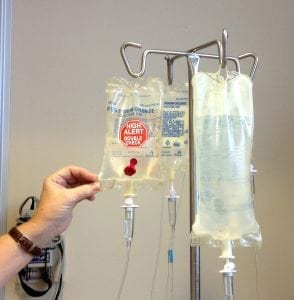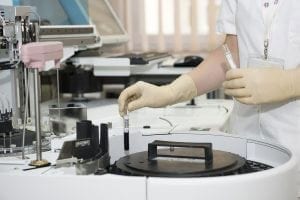For the first year and a half of her life, Audrey seemed to be a healthy child. Her parents Tenneil and Tom had no real concerns about her health. So when Audrey, in February 2017, began showing some worrisome symptoms, her parents figured that she had a cold. Audrey was fussy. She had trouble eating and sleeping, was throwing up, and had a fever that wouldn’t seem to drop. Even with treatment, the girl burned up. Two days later, Tenneil and Tom knew that there was a deeper issue. A trip to the hospital brought newfound worries. The nurse, noticing that Audrey had tachycardia, told the family that their daughter might have meningitis. The tests came back negative – but the doctor was convinced that there was something happening. After an additional week of tests, shares reporting by Kidspot, Audrey was diagnosed with a blood and bone marrow cancer called acute myeloid leukemia (AML).
Audrey’s Story
Her parents were shocked. AML is already an uncommon cancer. But it typically affects adults. In fact, risk factors for developing AML include being male, smoking cigarettes, increasing age (with most cases happening after age 65), radiation, and cancer treatment. For it to happen in a young girl seemed wildly off base and markedly unfair. More so, because AML so often manifests in adults, many doctors may feel uncomfortable treating it in children; this would require potentially unique treatment approaches. The doctors told her parents that Audrey had a 30-40% chance of surviving the ordeal.
Audrey immediately began high-dose chemotherapy. While it was effective, it also left her feeling incredibly ill. Her parents’ hearts dropped every time their daughter threw up again. Audrey lost her hair and experienced severe gastrointestinal distress.
Slowly but surely, Audrey improved. By July 2017, she finished treatment.
Over the years, Audrey has needed to undergo monitoring and various tests to ensure her health. As of today, at 7 years old, she is considered “cured” of her cancer.
But that hasn’t stopped Tenneil from raising her voice and advocating for increased AML awareness, research, and support. Advancing medical knowledge requires research and support. But medical research can be costly, implementing a barrier. Later this month, Tenneil plans on taking part in a 10K race. During the race, she will be raising funds for the Australian Cancer Research Foundation that can be used to drive important oncological research. Right now, donations to the Australian Cancer Research Foundation are being used to fund research such as:
- Determining the molecular structure of proteins for a new cancer drug
- Developing treatments for tumors with more than one gene mutation
- Funding equipment for a national program to improve outcomes for blood cancer patients
- Helping researchers learn how to interrupt the nutrition of cancer cells
If you’d like to contribute to the cause, you may donate here.
Acute Myeloid Leukemia (AML) Symptoms
Acute myeloid leukemia causes the bone marrow to create abnormal blood cells, crowding out healthy blood cells. This may lead to symptoms such as:
- Unexplained fever
- Easy and unusual bruising and bleeding
- Shortness of breath
- Extremely pale skin
- Frequent or recurrent infections
- Bone pain
- Fatigue and loss of energy
- Dizziness
- Unintentional weight loss







